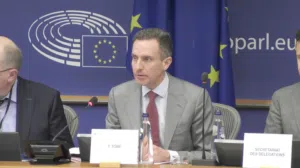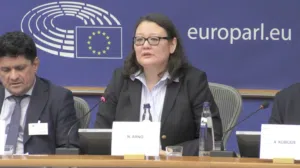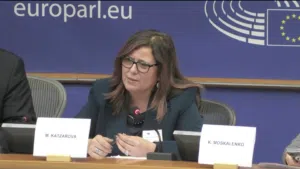Brussels – There is one phrase that effectively sums up the complex constructive role the European Union can play in the country that has been targeted for the past two years for its war of aggression against Ukraine: “The best time to support democracy in Russia was 20 years ago, the second is now.” Speaking these words is the president of the nongovernmental organization Free Russia Foundation, Natalia Arno, who made clear in the European Parliament the need for Brussels to support the other side of Russia’s war in Ukraine: Russian civil society silenced and persecuted even more intensely by Vladimir Putin’s regime.

A discussion between MEPs and Russian opposition figures staged in the European Parliament today (Feb. 14) as a reminder that “a sustainable peace in Europe requires the transformation of Russia into a democracy, and we need a strategy to get there,” as EPP MEP Tomas Tobé opened the discussion. The appointment comes a month before the presidential elections in Russia, from which democratic opposition forces were completely excluded (besides Putin, only three communist, liberal-nationalist, and ultra-nationalist candidates were allowed to run). “We need a regular exchange with Russia’s democratic opposition and with people who challenge the authoritarian and undemocratic regime, even at great personal risk”—from poisoning to lengthy prison sentences in labour colonies in Siberia—is the appeal of the French MEP who chaired today’s conference.

The President of the Free Russia Foundation, Natalia Arno
“Putin came to power with bombs over Chechnya and a quarter century later continues to rule by bombing a sovereign country and unleashing the biggest war in Europe since World War II,” was the debut at the European Parliament of the president of the Free Russia Foundation. At home, Putin has made “Russia a corrupt and bloodthirsty regime with censorship, repression, propaganda, and control of the media,” a country “based on the destruction of the rule of law, intolerance, and injustice,” where “no election since 2000 has been called free and fair by international observers.” Invasion of Ukraine and internal repression go hand in hand, not only in the view of the European Union but also of the opposition to Putin in the country: “For two years he has catapulted Russia from an autocracy to a bloody dictatorship, strengthening repressive legislation and striking down civil society, political opposition, independent journalists, and human rights lawyers.”

UN Special Rapporteur on the situation of human rights in the Russian Federation, Mariana Katzarova
Even elections are such only in a manner of speaking. “You don’t need a crystal ball to predict what will happen: Putin will win these elections, strengthen his power in the country, and consider them a confirmation of his war in Ukraine,” Arno summarized, reminding that the vote will also be held in the illegally occupied territories” in Ukraine. Because, even though these are not free elections and political opponents are also being physically eliminated, Putin “wants legitimacy” from the people, like all dictators. Words also confirmed by the United Nations Special Rapporteur on the situation of human rights in the Russian Federation, Mariana Katzarova: “Autocratic leaders who want to stay in office first silence the press and free media, making them tools of propaganda, then civil society, and finally attack neighbouring countries; even the best dictators of the twentieth century did that.”
The trend of repression in Russia “has been going on for two decades, but in the last two years, total political and civil repression has crystallized,” a demonstration that “democratic elections cannot work in countries where there is a dictatorship,” Katzarova reminded, urging European countries not to hinder Russians fleeing war and from the regimes of Russia and Belarus, “We have to defend everyone, even those who flee because they do not want to kill or be killed.” On the horizon must be the common future of the EU and Russia, which, even without Putin, is now not all rosy: “The regime is fragile and vulnerable, but when it will fall, it will only be the beginning of a hard process toward democracy, because attacks on civil society have accompanied every war,” Arno warned.
English version by the Translation Service of Withub

![Il presidente della Repubblica, Sergio Mattarella, con la presidente della Commissione europea, Ursula von der Leyen [Bruxelles, 21 maggio 2025. Foto: Emanuele Bonini per Eunews]](https://www.eunews.it/wp-content/uploads/2025/05/mattarella-vdl-120x86.png)


![Il presidente della Repubblica, Sergio Mattarella (sinistra), con il presidente del Consiglio Europeo, Antonio Costa [Bruxelles, 20 maggio 2025. Foto: Quirinale]](https://www.eunews.it/wp-content/uploads/2025/05/mattarella-costa-120x86.jpeg)